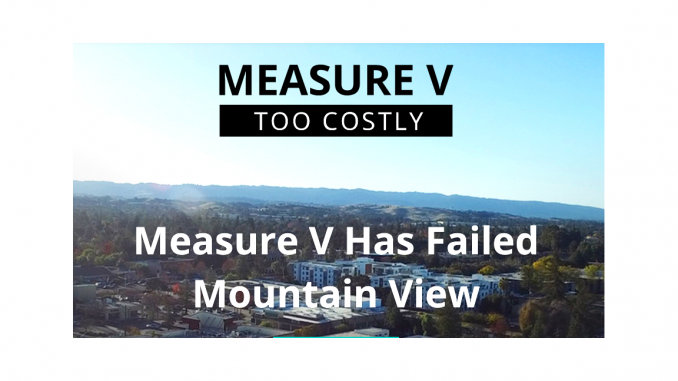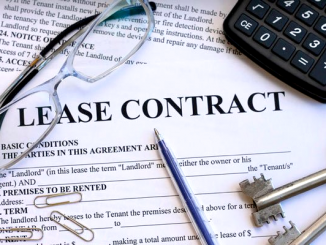
BY ALLISON LEVITSKY
Daily Post Staff Writer
A group called Measure V Too Costly, referring to the rent control measure that won 53.6% of Mountain View’s vote in 2016, is preparing to collect signatures for a November ballot measure that would ease up restrictions for landlords.
The measure makes it easier to evict problematic tenants and limits rent control to families earning less than the median household income for Santa Clara County, but doesn’t seek to rid the city charter of the rent control law.
“Tenants need some protection and this is a solution that everyone can live with, hopefully,” said Laura Teutschel, a San Carlos-based communications consultant working for Measure V Too Costly.
Income qualifications
Currently tenants who make more than 120% of the median household income in Santa Clara County, or roughly $150,240 adjusted for family size, are ineligible for relocation assistance upon eviction.
The initiative would lower that limit to 100% of the median household income, preventing families who make more than $125,200 or so from receiving that help.
It would also limit rent increases to families with incomes that don’t exceed 100% of the median household income for the county, as adjusted for household size according to the U.S. Department of Housing and Urban Development.
“We want to make sure that people in need are serviced,” Teutschel said.
It would also require tenants to file an application annually and require tenants to bear the burden of establishing that their income is low enough to qualify for rent control.
The group filed an initiative to amend the city charter section applying to the rent control law on March 30.
City Attorney Jannie Quinn has 15 days to draft a title and summary, and the group will need to collect 5,500 signatures to qualify for the November ballot.
Teutschel said the group may need to hire professional signature gatherers for the job.
Stopping a bureaucracy from expanding
The initiative would prevent the City Council-appointed Rental Housing Committee from accessing general funds without council approval, which Teutschel said is mainly intended to prevent them from paying themselves a salary.
“We just want to make sure that the Mountain View rent board don’t get any ideas about expanding the cost to taxpayers,” Teutschel said. “Once a bureaucracy is put in place, it tends to expand.”
Currently under the rent control law, the committee is allowed to receive funding from any available source for “reasonable and necessary expenses.”
The $2.6 million organization that runs the rent control program is financed entirely by rental units. Landlords are charged $155 per year.
The initiative would reduce that to $100 per unit starting in 2019.
In subsequent years, the committee wouldn’t be allowed to raise that fee by more than the most recent consumer price index for the San Francisco-Oakland Area according to the Bureau of Labor Statistics.
Under the current rent control law, landlords are only allowed to charge for capital improvements to their rental units if the improvements are “necessary to bring the property into compliance” or “maintain compliance with applicable local codes affecting health and safety.”
The initiative would strike that rule, allowing landlords to improve their properties however they see fit and to charge higher rents accordingly.
Currently the rent control law allows the Rental Housing Committee to suspend rent control rules, including around eviction restrictions and rent stabilization, if the city’s average annual rental housing vacancy rate is found to exceed 5%.
The initiative would lower that number to 3%.
It would allow landlords to evict tenants who disturb the “peace, quiet, comfort or safety” of the landlord or other tenants without first having to post a written notice to cease.




What’s better than rent controls? A tax on vacant lots and unoccupied housing. While rent controls make it less attractive to supply housing, a vacancy tax makes it less attractive NOT to supply housing! A vacancy tax of $X/week makes it $X/week more expensive NOT to get a tenant, and thereby REDUCES, by $X/week, the minimum rent that will persuade the owner to accept a tenant.
If NEW buildings are exempted from rent control in an effort to encourage construction, the stock of rent-controlled housing becomes an ever-shrinking fraction of the housing supply — unless the exemption is only for a limited time, in which case there is less incentive to build! A vacancy tax avoids such conflicts; it unequivocally tends to increase the effective supply of housing and therefore to reduce rents.
Similarly, a vacancy tax on commercial property would reduce rents for job-creating enterprises.
With a sufficiently heavy vacancy tax, evictions due to foreclosures would be consigned to the past, because the foreclosing bankers, in order to avoid the tax, would want to retain the current tenants or former owner-occupants as continuing tenants. Of course the existing stock of empty foreclosed homes would be immediately made available for rent, as it should have been all along — not just drip-fed to buyers over a period of years.
Under a vacancy tax, squatters would not count as occupants, because they don’t officially exist. So the squatters (and the nuisances they cause) would be displaced by lawful tenants. The owners would get rent, the tenants would get accommodation, and the neighbors would get peace.
A vacancy tax would be GOOD FOR REALTORS — who would get more rental-management fees for properties coming onto the rental market, plus commissions from any owners who decided to sell vacant properties.
And the political trump card… Avoidance of the vacancy tax would initiate economic activity, which would expand the bases of other taxes, allowing their rates to be reduced, so that the rest of the city/state/country gets a tax cut!
The problem with Measure V is that it doesn’t apply to apartments built after 1985. I’m hoping there’s a measure this fall that will fix that.
It’s 1995, not ’85.
I agree so we need to repeal the state’s 1995 Costa Hawkins Rental Housing Act, which prevents rent control from being applied to all housing built after 1995: http://www.tenantstogether.org/campaigns/repeal-costa-hawkins-rental-housing-act
They should put a complete repeal on the ballot. Let the people decide if they like how this has worked out. I don’t think people like how this has gone.
Rental property prices in Mountain View and the whole SF Bay Area are out of control and greedy landlords and real estate developers are a huge part of the problem. What we need is Measure V to remain as is AND build on that effort by also initiating a tax on vacant lots and unoccupied housing. Reducing the vacancy rate and limiting rent increases can both be used in conjunction to create a more affordable housing market here in Mountain View. And as a Human Rights City, Mountain View can be a leader in Silicon Valley to uphold the value of housing as a human right.
Heather, can you tell me where rent control has been a success? Have you ever visited Berkeley and looked at the shabby rental housing there? Have you ever wondered why East Palo Alto continues to look like a slum? It’s because rent control stops property owners from making significant improvements to their properties. Why? They can’t pay for them with the limited rent increases allowed under rent control. So the housing stock continues to deteriorate, year after year. Rent control also causes property owners to take apartment off the market and use the property for something else. Converting an office building to apartments or R&D space becomes an enticing option with rent control. As a result, the housing supply shrinks. And that’s exactly the opposite of rent control advocates promise voters. In a few years, Mountain View residents will realize rent control is stupid. It may not happen this fall, because the ill effects of the ordinance haven’t been fully felt. But in 2 or 3 years, there will be a massive outcry to repeal rent control.
Hi Kevin, landlords tend to always make the minimum necessary repairs no matter what their rate of return on their investment in a rental property. Given the outrageous rent prices in 2016, I’m sure landlords are making more than a fair rate of return with Measure V in place and I haven’t seen a shred of evidence to suggest otherwise. Landlords as the owning class have never been known for their generosity or empathy for the renting class because their whole goal of owning rental properties is to make money so they usually do the minimum when it comes to repairs and maintenance to maximize profit. And even if a landlord is not able to make a fair investment return, they are able to petition the RHC under Measure V. I think its pretty clear that California has set laws like Prop 13 and Costa Hawkins in place to benefit the owning class for decades and now we have a housing crisis thanks in part to those laws along with City Council’s making deals with Big Tech companies to bring in more employees and office space without any consideration for housing. I lived in Washington, DC which has some of the strongest tenant and rent control laws in the country and the housing stock there was certainly not deteriorating nor have the rental prices been skyrocketing like here in the Bay Area even though DC saw a huge influx of residents in the last 10-15 years. Rent control laws need to be regional (not just a city here or there) and they need to be in place over decades before they become the new normal for the owning class to conduct their rental businesses in an area. There certainly hasn’t been a huge public outcry to repeal rent control in East Palo Alto, Berkeley or Oakland but then again, I think there are people in those cities that are more open-minded about housing as a human right versus just making elitist remarks about a neighborhood or community by calling it a slum. And I guarantee that redlining had a much more significant impact on the residents and the housing stock of East Palo Alto than rent control ever did. California tenants are starting to organize en masse and Measure V is only one of many rent control initiatives being pursued in order to address the housing crisis in this state which is the result of the owning capitalist class caring more about money than people.